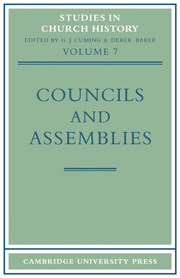Book contents
- Frontmatter
- Preface
- Contents
- Contributors
- Abbreviations
- Public welfare and social legislation in the early medieval councils (Presidential Address)
- National synods, kingship as office, and royal anointing: an early medieval syndrome
- The case of Berengar of Tours
- Ecclesiastica and Regalia: Papal investiture policy from the Council of Guastalla to the First Lateran Council, 1106–23
- Viri religiosi and the York election dispute
- Councils and synods in thirteenth-century Castile and Aragon
- The Byzantine reaction to the Second Council of Lyons, 1274
- The Council of London of 1342
- Education in English ecclesiastical legislation of the later Middle Ages
- The representation of the universitas fidelium in the councils of the conciliar period
- Nicholas Ryssheton and the Council of Pisa, 1409
- The condemnation of John Wyclif at the Council of Constance
- Some aspects of English representation at the Council of Basle
- The Council of Basle and the Second Vatican Council
- The Colloquies between Catholics and Protestants, 1539–41
- King James I's call for an ecumenical council
- John Hales and the Synod of Dort
- Assembly and Association in Dissent, 1689–1831
- The Convocation of 1710: an Anglican attempt at counter-revolution
- Laymen in synod: an aspect of the beginnings of synodical government in South Africa
- The First Vatican Council
- Kikuyu and Edinburgh: the interaction of attitudes to two conferences
John Hales and the Synod of Dort
Published online by Cambridge University Press: 12 March 2010
- Frontmatter
- Preface
- Contents
- Contributors
- Abbreviations
- Public welfare and social legislation in the early medieval councils (Presidential Address)
- National synods, kingship as office, and royal anointing: an early medieval syndrome
- The case of Berengar of Tours
- Ecclesiastica and Regalia: Papal investiture policy from the Council of Guastalla to the First Lateran Council, 1106–23
- Viri religiosi and the York election dispute
- Councils and synods in thirteenth-century Castile and Aragon
- The Byzantine reaction to the Second Council of Lyons, 1274
- The Council of London of 1342
- Education in English ecclesiastical legislation of the later Middle Ages
- The representation of the universitas fidelium in the councils of the conciliar period
- Nicholas Ryssheton and the Council of Pisa, 1409
- The condemnation of John Wyclif at the Council of Constance
- Some aspects of English representation at the Council of Basle
- The Council of Basle and the Second Vatican Council
- The Colloquies between Catholics and Protestants, 1539–41
- King James I's call for an ecumenical council
- John Hales and the Synod of Dort
- Assembly and Association in Dissent, 1689–1831
- The Convocation of 1710: an Anglican attempt at counter-revolution
- Laymen in synod: an aspect of the beginnings of synodical government in South Africa
- The First Vatican Council
- Kikuyu and Edinburgh: the interaction of attitudes to two conferences
Summary
On 24 April 1619 the Synod of Dort sat for the 154th, and last, time. Ostensibly summoned to resolve differences between Dutch Remonstrants and Contra-Remonstrants within a context of Calvinist theology, in reality it pronounced predetermined decrees on unconditional election, a limited atonement, man's total depravity, the irresistibility of grace, and the perseverance of the elect.
The Synod was national (sometimes, decidedly ‘local’) in nature; yet, because other states—Great Britain, France, Hesse, and the Palatinate among them—sent delegates, it assumed in the eyes of such men as James I and Du Plessis-Mornay an importance equal to that of Trent.
Not all have so regarded it, however, and a contemporary, Richard Montague, soon to become Bishop of Chichester, was accused of casting a foul blot on Dort as early as 1626 (especially on James I's representatives there), by maintaining that the discipline of the Church of England differed fundamentally from that approved by Dort, and that the British delegates had been far from unanimous in their support of its decisions. For this, George Carleton, his predecessor at Chichester, and an English delegate, took him to task as under-estimating the strength of the English opposition to the ruling by the Synod on the parity of ministers, and their other objections to the discipline it laid down; adding, nevertheless, that it was doctrine, not discipline, that was the chief concern.
- Type
- Chapter
- Information
- Councils and Assemblies , pp. 277 - 288Publisher: Cambridge University PressPrint publication year: 1970



